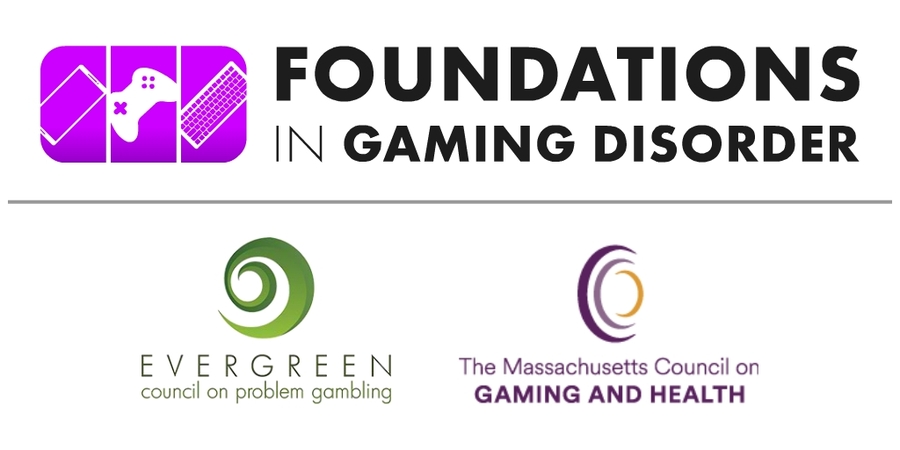Launch comes amid an estimated 8.6 million Americans struggling with at-risk or problematic gaming disorder since COVID-19
OLYMPIA, WA, March 29, 2023 /24-7PressRelease/ — Training seeks to provide vital support for clinicians, educators, parents, and community professionals
Amid surging national rates of video gaming addiction, a breakthrough, on-demand training, Foundations in Gaming Disorder, is available today. The program, the first 30-hour gaming training in the world to be fully accredited by the International Gambling Counselor Certification Board (IGCCB), focuses on preparing professionals across sectors with skills to screen, identify, and treat at-risk and problematic gaming disorder.
The training, also known as Foundations, is a joint collaboration between The Massachusetts Council on Gaming and Health and The Evergreen Council on Problem Gambling. Foundations features cutting-edge curricula from world-class experts such as Ed Spector, PhD, Hilarie Cash, PhD, and Marc Potenza, PhD, MD.
For many, video gaming fulfilled socialization needs during the COVID-19 pandemic. However, experts say this expansion spurred an increase in problematic gaming. Key groups interfacing with those at-risk for and experiencing gaming disorder need the knowledge to meet these new demands.
“Gaming disorder remains greatly underdiagnosed and undertreated,” shares Clifford Sussman, MD, a Foundations presenter and psychiatrist specializing in video gaming addiction. “More individuals than ever are struggling in our families and communities. If we’re serious about improving post-pandemic health, being able to identify and screen for this condition is critical.”
Three distinct training tracks allow participants to customize their learning. Tracks encompass a range of content levels, from parents and community members unpacking the basics to seasoned clinicians treating patients. Topics cover prevention through treatment and recovery. Courses include the evolution of gaming history and culture, prevention strategies, counseling skills, leading therapies, and even how gaming disorder can co-occur with depression, autism, and ADHD.
The curriculum aims to build participants’ understanding of gaming and problematic gaming while dispelling myths.
“It is not unusual to think people should just be able to turn off a console or computer and walk away,” explains Evergreen Council on Problem Gambling Executive Director Maureen Greeley. “This reasoning turns the discussion into a moral issue, and it’s not. Gaming disorder is a massive public health issue likely impacting millions.”
Gaming disorder, adopted as a diagnosis by the World Health Organization in 2019, refers to a preoccupation with video games at the expense of physical-world responsibilities and connection. Approximately, 4% of U.S. gamers are potentially suffering from gaming disorder. That’s 8.6 million Americans — on par with the population of New York City.
Foundations seeks to equip participants to support an overlooked audience in the gaming community: adults. The average age of a gamer is 33 years old, and 79% of gamers are 18 or older.
The on-demand format of Foundations allows participants to access and work through the program at their own pace from anywhere in the world. Individuals who successfully complete their selected training track will be among the first globally who may qualify to earn a Gaming Disorder Certification with 30 Continuing Education Units. For the latest information on certification options and requirements, visit IGCCB.org.
“Effective professional development is all about meeting the moment,” said Marlene Warner, CEO of The Massachusetts Council on Gaming and Health. “The demand for trained professionals who can understand and address gaming disorder is growing. We’re excited for participants to be the first in the world to receive training to best tackle these concerns.”
Foundations in Gaming Disorder is live now. Professionals can register online at WhatIsGamingDisorder.com.
The Evergreen Council on Problem Gambling
The Evergreen Council on Problem Gambling is a nonprofit organization dedicated to increasing awareness of public health issues around problem gambling and gaming in diverse cultures, expanding the availability and integration of services, and supporting advocacy, research, and programs for education, prevention, treatment, recovery, and responsible gambling and gaming.
The Massachusetts Council on Gaming and Health
For 40 years, The Massachusetts Council on Gaming and Health is a statewide nonprofit agency that promotes public health by mitigating the negative personal and community impacts of gambling and gaming. We accomplish our mission through training and education, federal and state advocacy, research, and prevention and recovery programs.
Phil Sherwood, The Massachusetts Council on Gaming and Health, psherwood@macgh.org and Rob Maya, The Evergreen Council on Problem Gambling, rmaya@evergreencpg.org
—
For the original version of this press release, please visit 24-7PressRelease.com here





